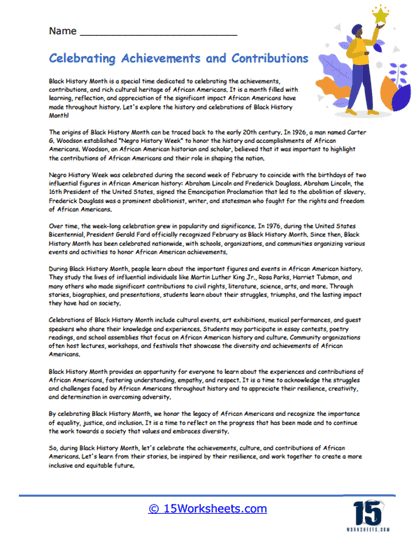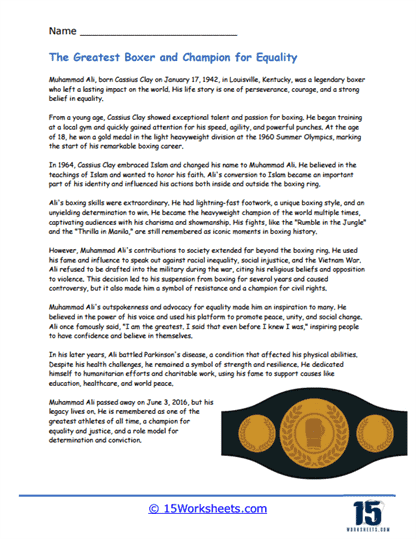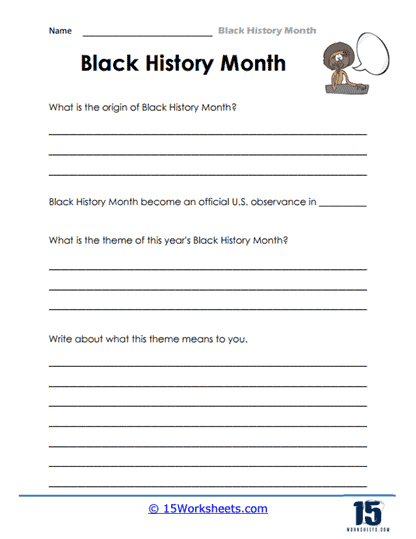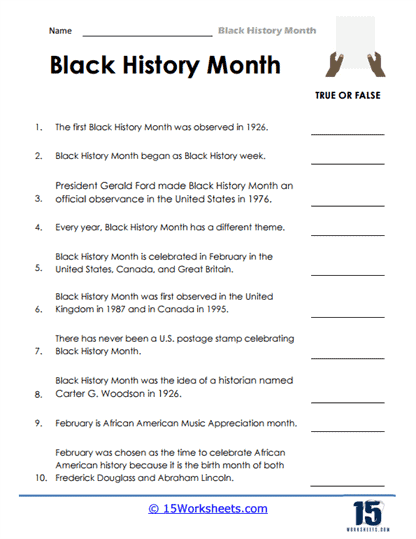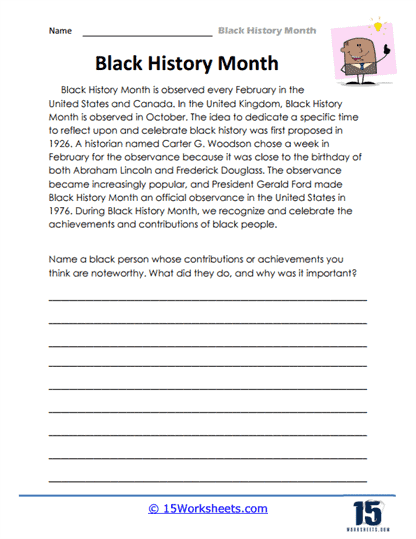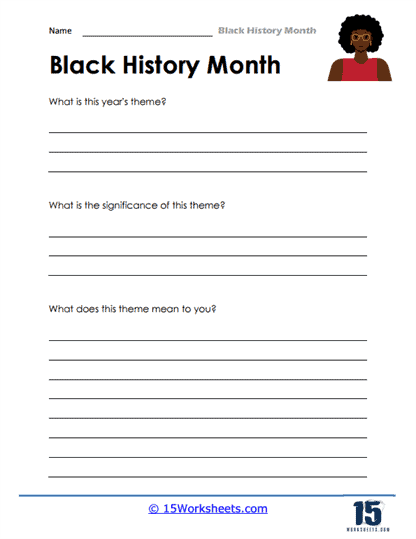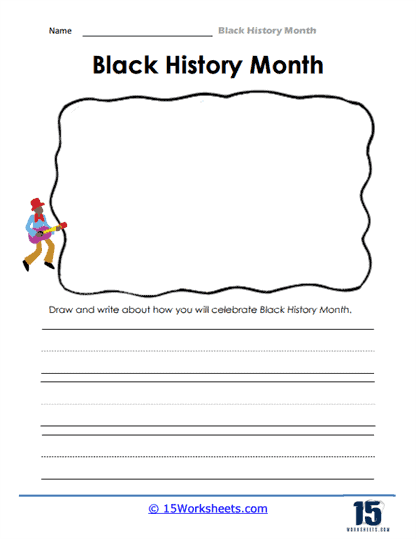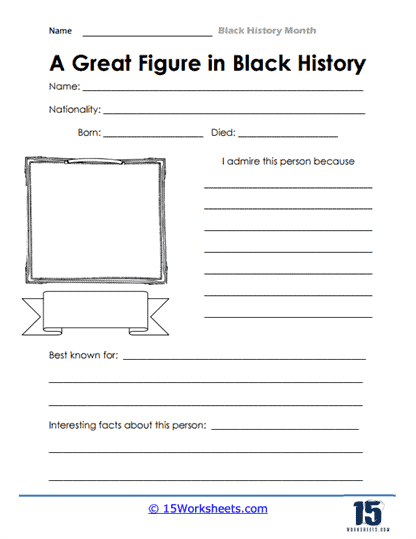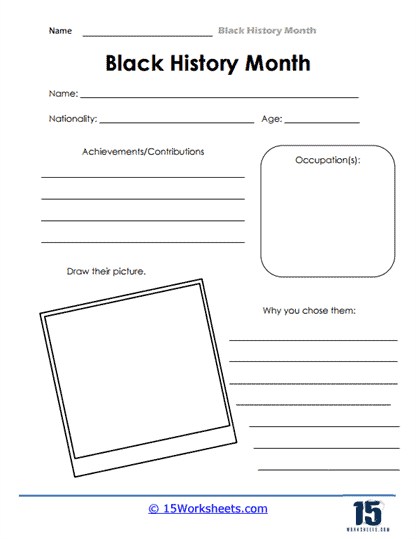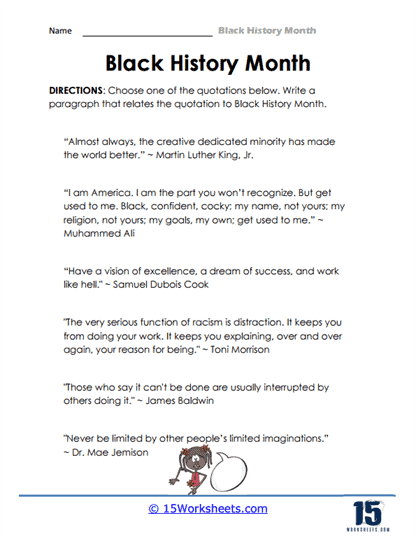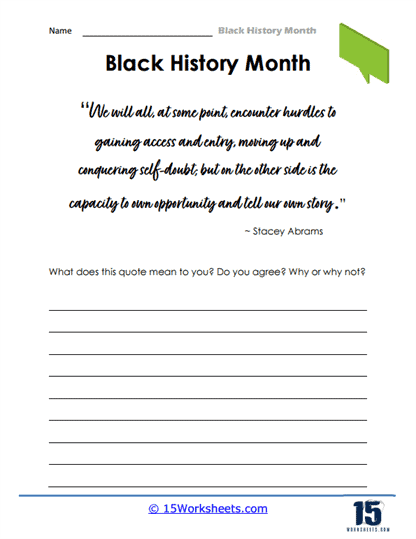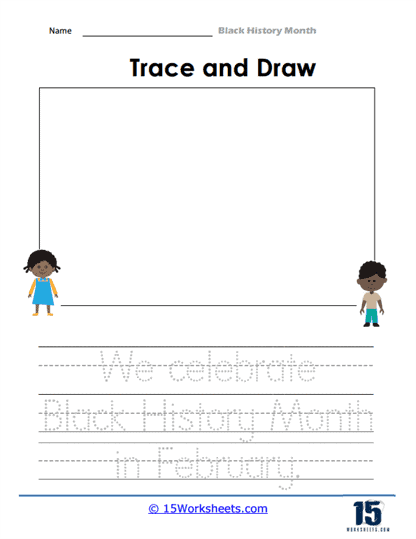Black History Month Worksheets
All About These 15 Worksheets
This series of 15 worksheets is an inspiring and educational resource designed to honor the achievements, contributions, and experiences of Black individuals throughout history. These worksheets provide students with an opportunity to explore the rich heritage, significant events, and influential figures associated with Black History Month. Through engaging activities, critical thinking exercises, and creative projects, students will deepen their understanding of Black history and foster a sense of appreciation and cultural inclusivity. Through these worksheets, students will:
- Understand the purpose and significance of Black History Month, and reflect on what it personally means to them;
- Reflect on the legacies and contributions of notable black persons;
- And discover inspiring quotes from influential black individuals, and discuss their relevance to the principles of equality and justice.
This series provides an empowering and enlightening resource for students to commemorate and honor the achievements, struggles, and cultural contributions of black individuals throughout history. Through a range of activities encompassing notable figures, inspiring quotes, timelines, quizzes on historical facts, and personal reflection, students will deepen their knowledge, critical thinking skills, cultural appreciation, and commitment to equality and justice. Overall, these worksheets foster a sense of inclusivity, empathy, and respect, promoting a more inclusive and equitable society for all.
What is Black History Month?
Black History Month is an annual observance dedicated to celebrating the achievements and contributions of Black individuals in history, culture, and society. It is observed during February in the United States and Canada, while in the United Kingdom, Ireland, and the Netherlands, it is celebrated in October.
Black History Month originated in the United States with the efforts of historian Carter G. Woodson and the Association for the Study of Negro Life and History (now the Association for the Study of African American Life and History). In 1926, they initiated the first “Negro History Week” during the second week of February, chosen to coincide with the birthdays of Abraham Lincoln and Frederick Douglass, both of whom were significant figures in Black history. Over time, the week-long celebration evolved into a month-long observance, officially recognized as Black History Month by President Gerald Ford in 1976.
The purpose of Black History Month is to recognize and honor the achievements, struggles, and experiences of Black people throughout history. It provides an opportunity to highlight the often-overlooked contributions of Black individuals in various fields, such as science, art, literature, politics, and civil rights. Black History Month also aims to promote awareness and understanding of the history of Black people and their role in shaping societies worldwide.
There have been numerous influential and prominent Black individuals throughout history who have made significant contributions to various fields, such as civil rights, politics, literature, arts, sports, and sciences. It is difficult to definitively determine the “greatest” people, as this is subjective and depends on individual perspectives. However, here are some of the most celebrated and influential figures in Black history.
- Martin Luther King Jr.: A civil rights leader who fought for racial equality in the United States through nonviolent means. He is best known for his “I Have a Dream” speech and his role in the advancement of the Civil Rights Act of 1964 and the Voting Rights Act of 1965.
- Harriet Tubman: An abolitionist and conductor on the Underground Railroad, who helped many enslaved people escape to freedom.
- Frederick Douglass: A former enslaved person turned abolitionist, writer, and orator, who became a leading voice in the anti-slavery movement.
- Rosa Parks: A civil rights activist known for her refusal to give up her bus seat to a white passenger, which sparked the Montgomery Bus Boycott and ultimately led to the desegregation of public transportation.
- W.E.B. Du Bois: A sociologist, historian, and civil rights activist, who co-founded the National Association for the Advancement of Colored People (NAACP) and was an early advocate for Pan-Africanism.
- Maya Angelou: A renowned author, poet, and civil rights activist, best known for her autobiography “I Know Why the Caged Bird Sings.”
- Nelson Mandela: The first Black president of South Africa, who fought against apartheid and became a symbol of hope and reconciliation for his nation and the world.
- Dr. Percy Julian: A African American research chemist and a pioneer in the chemical synthesis of medicinal drugs from plants. He is best known for his work on synthesizing physostigmine, a compound used to treat glaucoma, and his development of an affordable method to produce cortisone, a hormone used to treat rheumatoid arthritis and other inflammatory conditions. Dr. Julian’s groundbreaking research in the synthesis of steroids also laid the foundation for the development of oral contraceptives.
- James Baldwin: A prominent writer and social critic, whose works explored themes of race, sexuality, and identity in American society.
- Thurgood Marshall: The first Black Supreme Court Justice in the United States, who played a significant role in the desegregation of public schools through his involvement in the landmark case Brown v. Board of Education.
This list is by no means exhaustive, as there have been many other remarkable black individuals who have made lasting contributions to society. The individuals mentioned above are just a few examples of the countless leaders, artists, scientists, and activists who have shaped history and left a lasting impact.
During Black History Month, schools, universities, cultural institutions, and community organizations often host events, programs, and exhibits to celebrate and educate people about Black history and culture. These activities may include lectures, film screenings, art exhibits, performances, and discussions that emphasize the importance of acknowledging and celebrating the achievements of Black individuals.

